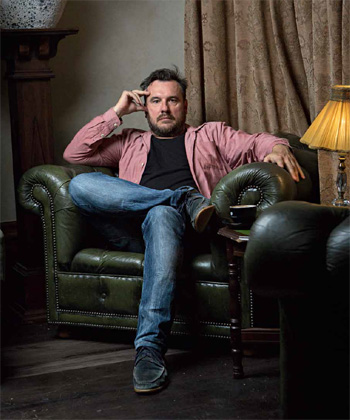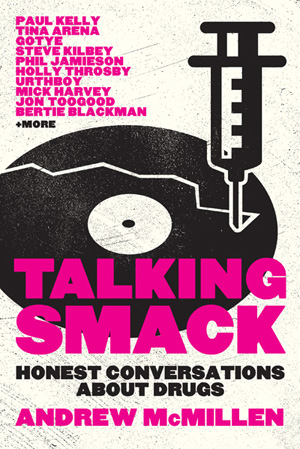Qweekend story: ‘The Player: John Collins and The Triffid’, November 2014
A story for the November 1-2 issue of Qweekend magazine. The full story appears below.
The Player
Making it as a muso is a hard act to follow, but ex-Powderfinger bassist John Collins is rolling the dice with his new gig in venue management.
by Andrew McMillen / Photography by David Kelly
++
For now, the only music heard in this room comes from a dust-coated radio audible in intermittent bursts between a dissonant symphony of hammering, grinding and sawing. Shortly, though, this formerly vacant hangar in Newstead, in Brisbane’s inner-north, will come alive with the sounds of live music. On this midweek morning in early October, John “JC” Collins wears a blue hard hat and bright yellow high-visibility vest atop a black dress shirt and blue jeans. Transforming this building from a forgotten shell into what Collins hopes will become a shining light in Brisbane’s sparkling live music scene has occupied much of the past two years of his life.
Thick, black electrical cables snake down from the curved ceiling. At the far end of the hangar, a hip-high raised stage sits at the foot of a brick wall painted bright green. Its sizeable main hall and mezzanine will accommodate up to 800 guests. It will be the first significant venue to open in the inner city since West End’s 1200 capacity Hi-Fi debuted in 2009.
Outside, in the beer garden, a temporary worksite office is stacked atop shipping containers that will function as bars and a kitchen. In the adjacent “band garden”, green astroturf leads through to a stage door being painted grey. As Collins tours the construction site while consulting with a squad of architects, acoustic engineers and insulation specialists, The Triffid’s distinctive look and feel is slowly taking shape all around him. What began as an aspiration is very nearly a live, loud reality.
From the mezzanine vantage point, the team of hard-hats inspects the original rainwater-tank roof. It’s been kept intact, but perforated with thousands of finger-sized holes and stacked with several layers of insulation in order to absorb the venue’s maximum volume of 110 decibels – and, hopefully, to stop future nearby residents from complaining about the noise. The former industrial hub of Newstead is on the cusp of a property boom set to rival neighbouring Teneriffe and New Farm; across from the venue, five residential towers comprising 900 apartments will soon sprout.
Tapping the 60-year-old ribbed roof, lead architect Mick Hellen says with a smile: “This was JC’s bright idea, but it’s the worst possible shape for a music venue.” Collins laughs, and shoots back: “It’s still better than a square box, though. Hey, it worked for The Beatles at the Cavern Club,” he says, referring to the Liverpool venue where Beatlemania was born. Who knows what The Triffid will mean in time to emerging Brisbane acts?
++
When The Triffid opens its steel doors next Saturday, it will be almost four years to the day since the former Powderfinger bassist joined his bandmates for their final public performance at Brisbane Riverstage. The intervening years have not been particularly relaxing for Collins, 44, a restless soul who searched high and low for a project in which to invest his energy. After a two-decade career in which his identity was synonymous with four fellow musicians united under what became a household name, Collins initially struggled to find his own way.
In the two years following the band’s November 2010 finale, Collins hired a desk at a friend’s business in inner-north Bowen Hills with the intention of giving his days structure and purpose, and separating his work aspirations from his home life at Morningside, in the city’s east. There were protracted investigations into business ventures in race cars and printing companies, as well as extended travels with his wife of 14 years, Tara, and their children, 10-year-old twins Grace and Rosie and Scarlett, 7.
Eventually, he threw his weight behind the idea of a live music venue and after months of location scouting in the surrounding suburbs, he found the empty hangar on Stratton Street. Collins met with its owner in February 2013 and spent almost a year working through proposals, budgets and designs. “It was a tough year, because I felt like we had a good idea between us,” he says now. “I felt really strongly about it; I hadn’t felt this strongly since the ‘Fingers started. It was a gut feeling.”
Born in Murgon, 250km north-west of Brisbane, on April 27, 1970, Collins grew up in the town of Kerry near Beaudesert, 85km south of the capital. While attending boarding school at Brisbane Grammar in inner-city Spring Hill, he met fellow boarder Steven Bishop, with whom he shared a love for music. The pair began playing with another student, Ian Haug, after the budding guitarist noticed Collins wearing a handmade shirt that advertised Sydney band Sunnyboys. The trio formed the first iteration of Powderfinger in late 1988, and while Bishop vacated the drum kit in 1991, the three men occasionally play together in a band called the Predators, whose debut EP, Pick Up The Pace, was released in 2006.
“Powderfinger was an awesome thing. I loved it,” says Collins. “I don’t expect it to ever happen again with music, but I’ve always wanted to do something else. That was part of the decision to stop [in 2010], because if we’d stopped in our fifties, things would have been tougher; we worked through half our working lives.” In the intervening four years, singer Bernard Fanning and guitarist Darren Middleton have proceeded with solo careers, drummer Jon Coghill has pursued a career in journalism, and Haug has been recording at his home studio and joined Australian rock institution The Church. “It’s taken me three years to get that next act going,” says Collins.
++
Its name is rooted in both literary and musical references; not just John Wyndham’s 1951 science fiction novel The Day of the Triffids, but more appropriately, the Triffids were a seminal Australian band based in Perth during the 1980s. “A few people have said to me, ‘Why didn’t you call it The Hangar?’” says Collins, who is one of several partners in the venture. “But that sounds more like a beer barn to me. I wanted to make sure people understood it’s a creative space, not just a place to come and skol piss. If you’re in a band, and you ask ‘Where are we playing?’ and the manager says ‘There’s this new venue in Brisbane called ‘The Triffid’, automatically you’re more inclined to think, well, okay, they must be at least a bit creative…”
Beside the bar on the mezzanine level is an office that overlooks the lobby through glass salvaged from Powderfinger’s rehearsal space in Albion, in the city’s inner north, which was flooded a few years ago. To complete the fit-out, Collins is in the process of sourcing historic gig posters that will illustrate Brisbane’s rich musical heritage. The venue will fill a gap between The Zoo (capacity 500) and The Tivoli (1500) in Fortitude Valley, as well as The Hi-Fi on the other side of the river. “We definitely didn’t want to come in and tread on anyone’s toes,” says Collins. “Places like The Zoo, The Hi-Fi and The Tivoli are really important. We want to make the pie bigger, not take somebody’s slice.”
As we walk downstairs, I ask Collins what’s at stake here. “My reputation,” he replies. “And a bit of money. I’ve willingly put my name and my hand up to back this project. If it doesn’t work, my partners can walk and do another one, whereas I’ll go down with the ship. Obviously I’ve put a lot of time, energy and passion in, and I’d like it to work financially, too.”
Haug is confident his friend and bandmate has bet on the right horse, as it were. “We’ve played so many venues around the world; he knows how to do it, so the musicians will be happy with how it’s all set out,” says Haug of Collins. “He’s surrounded himself with the best people to do sound and lighting. He didn’t think it was going to be easy, but he probably didn’t realise it would be this hard to build it from the ground up.”
With a laugh, Haug adds: “He’ll be glad when it’s open, that’s for sure.”
The Triffid opens on Saturday, 8 November with a line-up that includes Saskwatch, The Creases and MT Warning. thetriffid.com.au



 Bassist John Collins saw it another way: “We thought, if he could sell steel, he could sell rock.” With the assistance of a lawyer, the band drew up a management contract which determined that everything outside of the actual music-making would be split six ways. “After that contract lapsed, we worked with him without a contract for most of our career,” says Haug. “Probably in retrospect it wasn’t a wise business decision for the band, but he did a good job for us.”
Bassist John Collins saw it another way: “We thought, if he could sell steel, he could sell rock.” With the assistance of a lawyer, the band drew up a management contract which determined that everything outside of the actual music-making would be split six ways. “After that contract lapsed, we worked with him without a contract for most of our career,” says Haug. “Probably in retrospect it wasn’t a wise business decision for the band, but he did a good job for us.”
